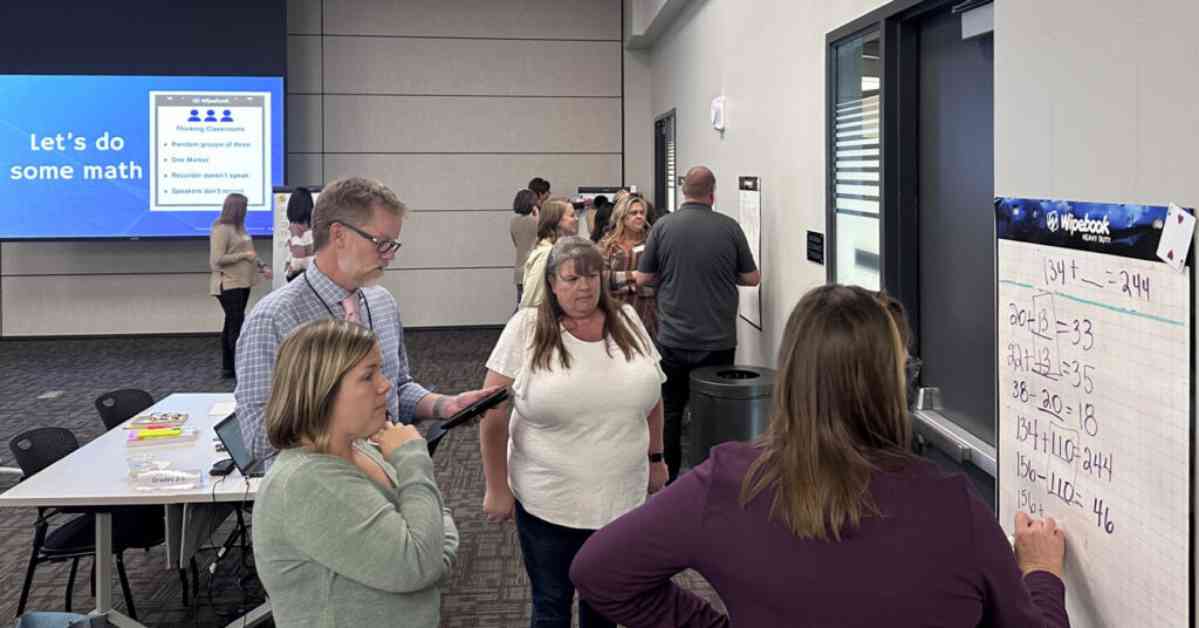Revamping Math Culture: Transforming Education in Riverside County
Riverside County educators are on a mission to revolutionize the way students learn math. Collaborating with the Riverside County Office of Education’s math team, teachers are embracing new strategies to enhance student thinking and engagement.
With a student population of approximately 430,000 spread across 23 districts, the Riverside County Office of Education plays a crucial role in providing instructional support and services in all content areas. Recent state math assessment data has highlighted the need for improvement in math education within the county. Despite efforts to boost performance on statewide assessments, growth in math proficiency has fallen short of expectations.
Rather than resorting to the traditional approach of adopting new textbooks or curricula, Riverside County has chosen to shift its focus towards evidence-based practices aimed at transforming the math culture countywide. By working collaboratively with districts, the county is striving to create a more enriching math learning experience for students.
Aligning with national organizations such as the National Council of Teachers of Mathematics and the National Council of Supervisors of Mathematics, Riverside County’s efforts are also in sync with California’s updated math framework. Emphasizing student access, positive identity development, and fostering agency among students, these goals directly mirror the principles outlined in the new framework.
Informed by national reports like “Adding It Up” and instructional models such as cognitively guided instruction (CGI), Riverside County’s approach to math education focuses on nurturing students’ existing knowledge and skills while promoting a balanced understanding of procedural skills, conceptual comprehension, and real-world application.
Traditionally, math instruction has heavily emphasized procedural skills like addition, subtraction, multiplication, and division to achieve correct answers. While these skills remain important, Riverside County advocates for a shift towards a deeper understanding of the underlying mathematical concepts. Instead of rote memorization, the county encourages students to share their thought processes and engage in meaningful discussions to develop a holistic understanding of math.
Through this cultural transformation in math education, Riverside County has observed a positive impact on equity within classrooms. By recognizing and valuing each student’s unique learning journey, educators are breaking down barriers to equitable access to math education. This shift in mindset acknowledges the diverse backgrounds and experiences that shape students’ mathematical abilities, fostering a more inclusive learning environment.
At the core of Riverside County’s math culture reform are frameworks like Teaching for Robust Understanding, “Street Data” by Shane Safir and Jamila Dugan, and the Universal Design for Learning. These guiding principles underscore the county’s three key service aspects: direct contract work with districts, countywide professional development, and the District Math Collaborative.
Professional development contract work with districts serves as a platform for introducing innovative ideas and practices in math education. Districts partner with Riverside County to customize professional development programs tailored to enhance math teaching and learning within their schools.
The District Math Collaborative, initially comprising seven districts in spring 2022, has expanded to encompass a broader network of educators. This collaborative effort focuses on evaluating teaching and learning systems, identifying areas for improvement, and implementing continuous enhancements to enrich the math education experience for students.
An annual highlight on Riverside County’s calendar is the Week of Math, an event designed to celebrate the joy of mathematics among educators, students, and families. Partnering with MIND Education and their MathMINDs program, the county offers engaging games, stories, and activities that promote exploration, problem-solving, and pattern recognition — essential skills for fostering a love of math in classrooms.
Feedback from schools indicates a positive reception to the math culture reforms, with students showing increased engagement and confidence in their mathematical abilities. Classrooms with high implementation of these new strategies report a noticeable shift in student participation and interaction, particularly among students previously labeled as struggling or disengaged.
One standout success story is Quail Valley Elementary in the Menifee Union School District, which has consistently surpassed state, county, and district averages on assessments in grade levels with high implementation of Riverside County’s math culture initiatives. This success serves as a testament to the collective effort and commitment to transforming math education within the community.
In conclusion, Riverside County’s journey towards revamping math culture is a testament to the power of collaboration, innovation, and a shared commitment to empowering students through math education. By embracing evidence-based practices, fostering a culture of inclusivity, and prioritizing student engagement, the county is paving the way for a brighter, more equitable future in math education.
Dennis Regus, Karon Akins, Diana Ceja, and Susan Jagger are leading the charge as mathematics administrators at the Riverside County Office of Education in California. Their vision for a transformative math culture is reshaping education practices and creating a more empowering learning environment for students across the county.
